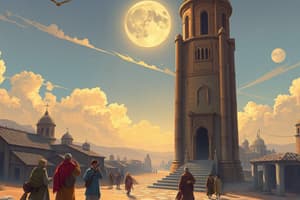Podcast
Questions and Answers
What was a significant factor that facilitated travel and exchange of goods in ancient times?
What was a significant factor that facilitated travel and exchange of goods in ancient times?
- Establishment of hotel chains
- Construction of railways
- Development of air travel
- Invention of money, writing, and the wheel (correct)
Which was NOT a form of early tourism mentioned?
Which was NOT a form of early tourism mentioned?
- Private enjoyment trips
- Travel for trade
- Cultural exchanges (correct)
- Religious pilgrimages
What was required of English pilgrims starting in 1388 when traveling to St. James of Galicia?
What was required of English pilgrims starting in 1388 when traveling to St. James of Galicia?
- Travel funds to be deposited
- Participation in local traditions
- Attendance at a local religious service
- Carrying permits similar to modern passports (correct)
What contributed to the increase in travel during the Roman Empire?
What contributed to the increase in travel during the Roman Empire?
What was one of the purposes of travel for religious reasons in early tourism?
What was one of the purposes of travel for religious reasons in early tourism?
Which event held by the Greeks in 776 BC exemplified early tourism for private enjoyment?
Which event held by the Greeks in 776 BC exemplified early tourism for private enjoyment?
What role did merchants play in early tourism?
What role did merchants play in early tourism?
What indicates the decline of travel during the Medieval Period?
What indicates the decline of travel during the Medieval Period?
What was the main reason people did not travel during the medieval period?
What was the main reason people did not travel during the medieval period?
What significant change occurred during the Renaissance concerning travel?
What significant change occurred during the Renaissance concerning travel?
Which city is known for becoming famous as a spa in the 1960s?
Which city is known for becoming famous as a spa in the 1960s?
What was the purpose of the 'Grand Tour' in the 17th century?
What was the purpose of the 'Grand Tour' in the 17th century?
What impact did the Industrial Revolution have on travel?
What impact did the Industrial Revolution have on travel?
What were spas known for during the 18th and 19th centuries?
What were spas known for during the 18th and 19th centuries?
What was a common travel destination for pleasure-seeking young men during the Renaissance?
What was a common travel destination for pleasure-seeking young men during the Renaissance?
How did the rise of the middle class affect tourism?
How did the rise of the middle class affect tourism?
Study Notes
Early Beginnings of Tourism
- Tourism roots trace back to the Old Testament with references to trade and religious travel.
- The Hebrew word "Torah" relates to tourism, emphasizing studying and exploration.
- Early tourism involved business travel for trade and pilgrimages to sacred sites.
Roman Empire Influence
- Roman Empire advancements facilitated travel due to improved roads and accommodation.
- Merchants extensively traveled for trade, aided by the invention of money and transport innovations like the wheel.
- Greek and Roman travelers engaged in commerce and private travel, including events like the Olympics.
Pilgrimages and Religious Travel
- Pilgrimages were common for fulfilling religious vows or seeking penance.
- Notable destinations included St. James of Galicia, and permits were required for English pilgrims starting in 1388, resembling modern passports.
Medieval Period Challenges
- Travel declined post-Roman Empire due to dangerous, poorly maintained roads.
- The term "travail" reflects the burdensome nature of travel during this era, limiting movement primarily to crusaders and pilgrims.
Renaissance and Educational Travel
- The Renaissance fostered educational travel, especially among British scholars.
- The "Grand Tour" became popular in the 16th century, where young men traveled to cultural centers for education and social engagement.
- Key destinations included France and Italy, particularly Venice, Florence, and Paris.
Spa Culture and Health Tourism
- The term "spa" derives from the Walloon word "espa," meaning fountain, highlighting medicinal bathing origins.
- Notable spa destinations emerged, including Tunbridge Wells in England and several resorts across Europe, combining health benefits with entertainment.
Industrial Revolution and Tourism Expansion
- The Industrial Revolution catalyzed significant changes in tourism scale and development.
- Technological advancements and urbanization created more leisure time, enabling the emerging middle class to engage in recreational travel.
Studying That Suits You
Use AI to generate personalized quizzes and flashcards to suit your learning preferences.
Description
This quiz explores the origins of tourism and hospitality from ancient times, highlighting early travel for business and religious purposes. It examines the impact of the Roman Empire on travel patterns and the evolution of tourism concepts leading to the 19th century.




